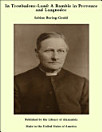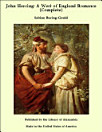The Book of Werewolves
Oct 2017 · Otbebookpublishing
Ebook
266
Pages
family_home
Eligible
info
reportRatings and reviews aren’t verified Learn More
About this ebook
With the shocking histories of 10 famous cases, this classic blends science, superstition, and fiction to tell the full story of the werewolves among us. The first serious academic study of lycanthropy and "blood-lust" written in English, this book draws upon a vast body of observation, myth, and lore. (Goodreads)
About the author
Sabine Baring-Gould (1834-1924) was a multifaceted English clergyman, archaeologist, folklorist, and novelist whose life and works continue to intrigue modern readers. Born into a wealthy family, Baring-Gould's early education was eclectic, traveling across Europe and developing a keen interest in languages and cultures. His most enduring legacy is perhaps his hymn "Onward, Christian Soldiers," which remains a staple in Christian liturgy.Baring-Gould's literary contributions are vast, spanning over 1,200 publications, including novels, biographies, and scholarly works on folklore and mythology. His fascination with the supernatural and the macabre is evident in his extensive collection of ghost stories and folklore, which have influenced contemporary writers like M.R. James and Neil Gaiman.A man of contradictions, Baring-Gould was both a devout Anglican priest and a passionate folklorist, often delving into pagan traditions and superstitions. His work in preserving and documenting English folk songs and tales was revolutionary, capturing the oral traditions that were rapidly disappearing in the face of industrialization.Controversially, Baring-Gould's views on race and class were reflective of his time, and some of his writings have been critiqued for their paternalistic tone. However, his pioneering efforts in folklore studies and his ability to weave the mystical with the mundane have left an indelible mark on the literary world.Baring-Gould's life was as colorful as his writings. He married Grace Taylor, a mill girl, defying Victorian social norms, and their love story adds a romantic dimension to his biography. His home, Lew Trenchard Manor, remains a testament to his eclectic tastes and boundless curiosity, filled with artifacts and manuscripts that offer a window into the mind of this enigmatic figure.
Rate this ebook
Tell us what you think.
Reading information
Smartphones and tablets
Install the Google Play Books app for Android and iPad/iPhone. It syncs automatically with your account and allows you to read online or offline wherever you are.
Laptops and computers
You can listen to audiobooks purchased on Google Play using your computer's web browser.
eReaders and other devices
To read on e-ink devices like Kobo eReaders, you'll need to download a file and transfer it to your device. Follow the detailed Help Center instructions to transfer the files to supported eReaders.








